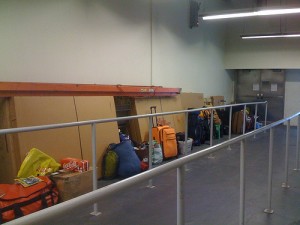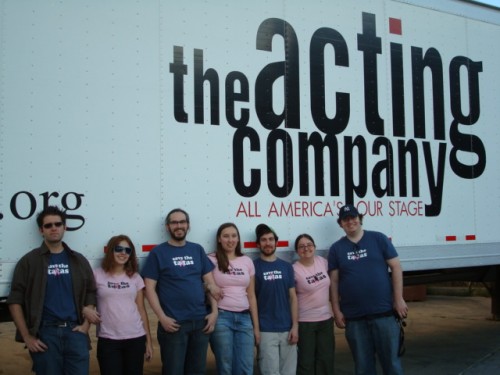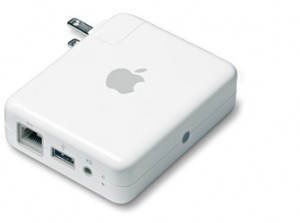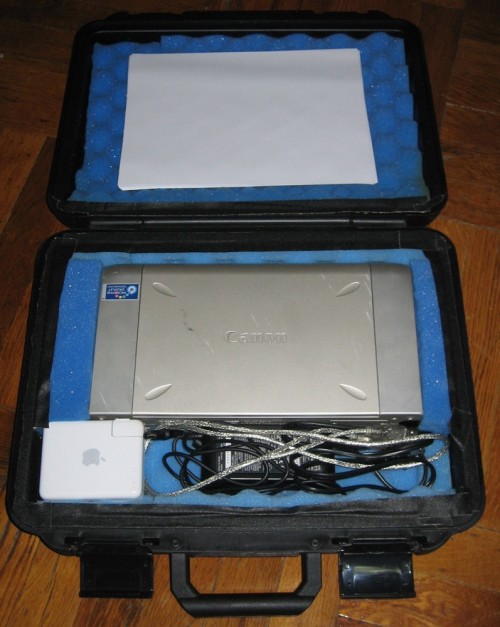 Late last night we departed Frostburg, MD, and this morning we woke up home-sweet-home on 24th St. and Lex. We said our final goodbyes to Bart, and unloaded all our luggage and other belongings from the bus into a hallway by the loading doors at Baruch College (see photo).
Late last night we departed Frostburg, MD, and this morning we woke up home-sweet-home on 24th St. and Lex. We said our final goodbyes to Bart, and unloaded all our luggage and other belongings from the bus into a hallway by the loading doors at Baruch College (see photo).
Last night in Frostburg was a Save the Ta-Tas Load Out. This is something we do every now and then, where the whole crew will wear our Save the Ta-Tas shirts that Daphne got us for opening night in New York. Like so, in Tucson:

We decided pretty much at the start of this leg that Frostburg would be a Save the Ta-Tas Load Out since it was the last venue before returning to New York. The interesting advantage of this was that the next morning when we got up in New York, it was easy to tell who had decided to sleep in their clothes, as they were the ones still wearing their Ta-Tas for load in. I didn’t exactly count, but I’d say it was four or five of us, including me. Speaking of which, we have submitted our photo to savethetatas.com, but it hasn’t been published yet. I did have a nice email conversation with their customer service lady about our company — she wants to see us when we come to California — and she assured me it would go up “soon.” That was like a month ago.
Baruch is kind of the most hellacious load-in situation ever. Unloading the truck on the street, followed by a lot of ramps and hallways, to a rather small freight elevator, and then down some more winding and public hallways to the theatre. Apparently it took 5 hours to unload the truck. Sadly for my friends, Nick and I did the stage manager thing and helped unload the road boxes, then broke off with our box and did our jobs and went home. We both felt bad for our friends, but my personal philosophy is that when you’re playing Poplar Bluff, MO and the show must go on, and you need a few more hands, that’s one thing. When opening a show in New York, there’s no reason stage managers should be needed to work as stage hands, without compensation and when their home is just a subway ride away. At any rate, I feel slightly less bad since I also had to come back at night for a late-night cueing session for The Spy. Due to the tightly packed schedule (if performances and film shoots manifested themselves as fish, this week’s would be sardines), there was no other time to do it but late tonight on load-in day, and as this is the New York premiere, we want to try to show it a little more love than it’s been given on our very Henry-heavy touring schedule. At least I had a chance to shower, change, and show up nicely dressed and clean like a normal person. I even have some simple jewelry on.
My first task upon coming back to Baruch at night was to set up our wireless network. As I have reported before in this post from December, Baruch’s theatre is in the third basement of their main building, surrounded by more concrete than any radio wave can get through, so cell service is a complete impossibility, and setting up a router in one room and expecting it to work three rooms down the hall is sketchy. When we teched The Spy here, it took me the better part of three days to get a reliable wireless signal to reach the theatre from the single ethernet cable in the production office. The solution I came up with was to bring in two of my own personal routers — an old UFO-shaped Airport Extreme, and an original Airport Express — and to place the Extreme on top of a filing cabinet in the production office, where the ethernet was, and to plug the Express in in the shop, which is just behind the stage. The signal from the Extreme went just far enough to reach the Express, which then passed it on just far enough to reach the tech tables in the house, but not quite enough for a steady signal in the booth. I may see what I can do about that this time, as I will be spending pretty much all my time in the booth.
This whole day has been deja vu. So many things have changed since we began our journey here, and yet there are other things that are exactly the same. When I came back at night, I found a couple of the tiny Spy columns, which we call “nubblies,” nestled against a diagonal wall, where six months ago another pile of short unused Spy columns sat when it was decided they weren’t needed (or something). This time they will be needed, but because we’re repping Henry and Spy, they are simply waiting there while Henry takes the stage. As soon as I glimpsed the greenroom through an open door I was instantly taken back to our final post-invited-dress notes session, on the eve of beginning the tour, and thought of all the people who were there who are no longer with the company. It’s been kind of a bittersweet return. But with all the drama along the way, the very fact that we are back here and performing both shows is an accomplishment in itself, so we can be proud of that.


 We’re teching The Spy at Baruch college, at the Nagelberg Theatre which is on level B3, so somewhere in the earth’s mantle, which I can only assume is why the A/C is always cranked so high. ¬†Of course cell service is nonexistant, and since the internal walls are made of generous helpings of concrete, even getting wifi from our production office to the house (probably about 60ft, if crows flew underground through concrete) took two days and two routers to pass the signal so we can get it at the tech tables. ¬†I never quite managed to get it to the booth.
We’re teching The Spy at Baruch college, at the Nagelberg Theatre which is on level B3, so somewhere in the earth’s mantle, which I can only assume is why the A/C is always cranked so high. ¬†Of course cell service is nonexistant, and since the internal walls are made of generous helpings of concrete, even getting wifi from our production office to the house (probably about 60ft, if crows flew underground through concrete) took two days and two routers to pass the signal so we can get it at the tech tables. ¬†I never quite managed to get it to the booth. I’m about to start rehearsals for a new show, which has got me thinking about getting all my goodies set up to take with me to rehearsal. One of my favorite ways of making things more efficient in the rehearsal room is to set up my own wireless network for the use of the stage management team, creative team, or even the actors who want to use a laptop or other wireless device on their breaks.
I’m about to start rehearsals for a new show, which has got me thinking about getting all my goodies set up to take with me to rehearsal. One of my favorite ways of making things more efficient in the rehearsal room is to set up my own wireless network for the use of the stage management team, creative team, or even the actors who want to use a laptop or other wireless device on their breaks.
